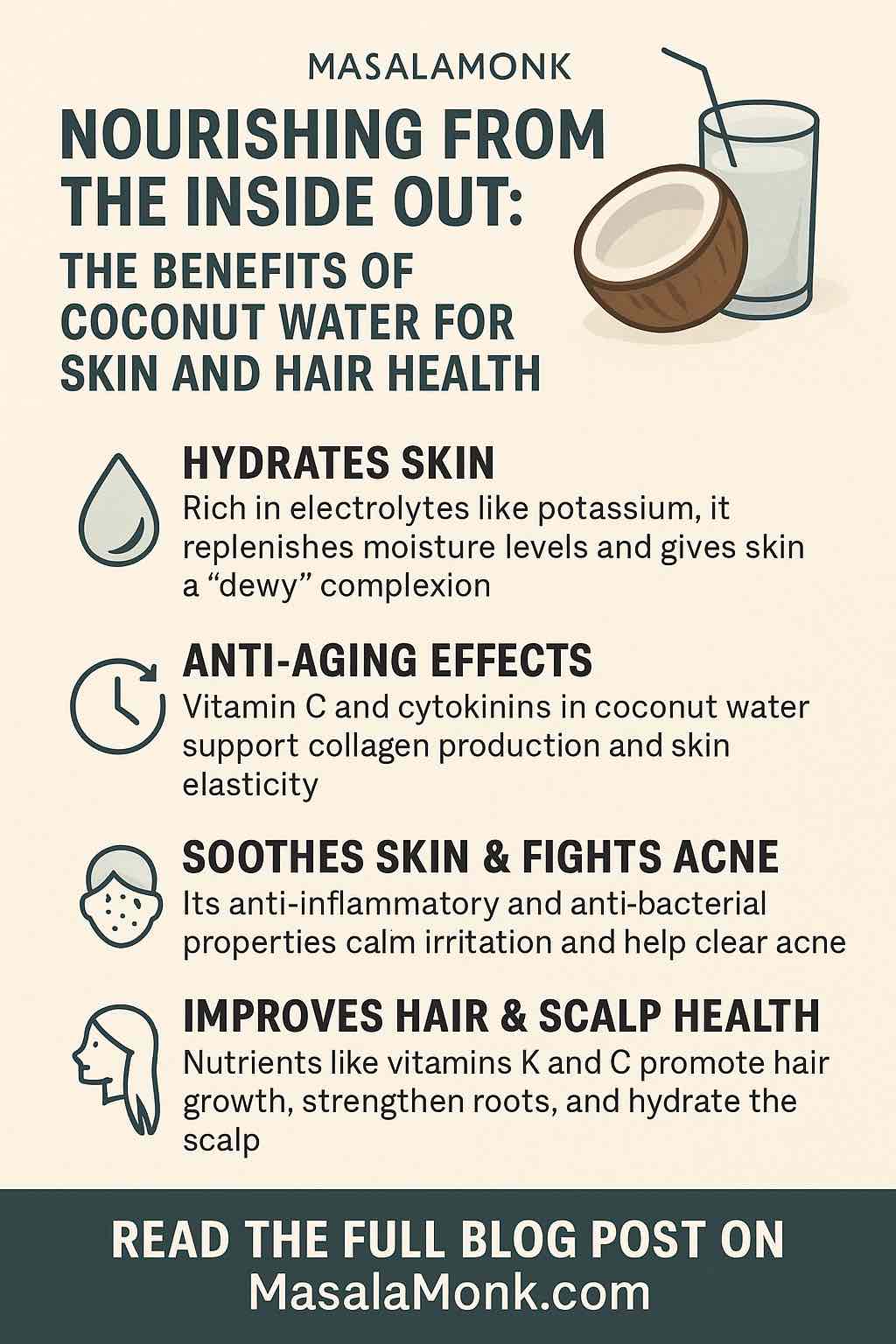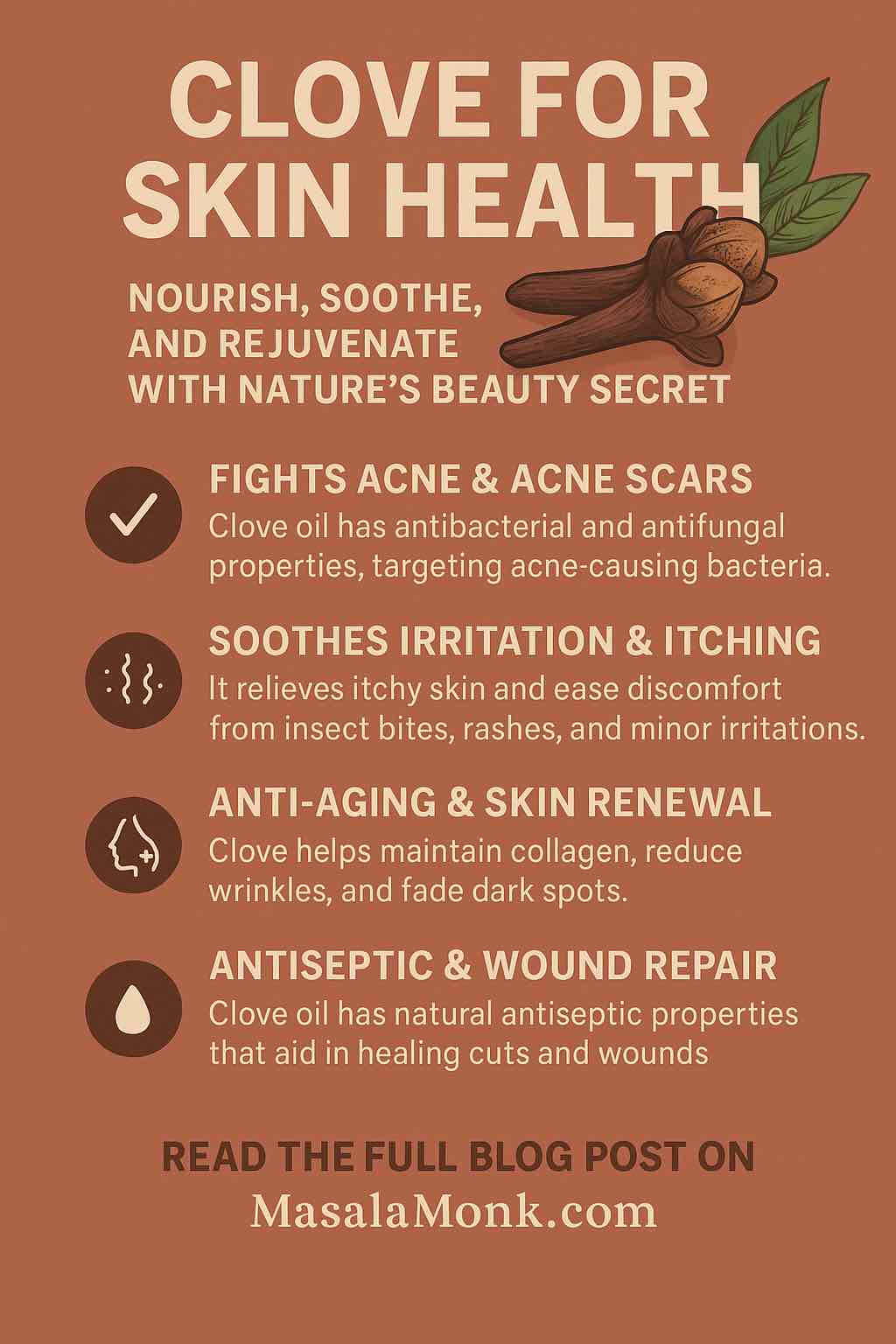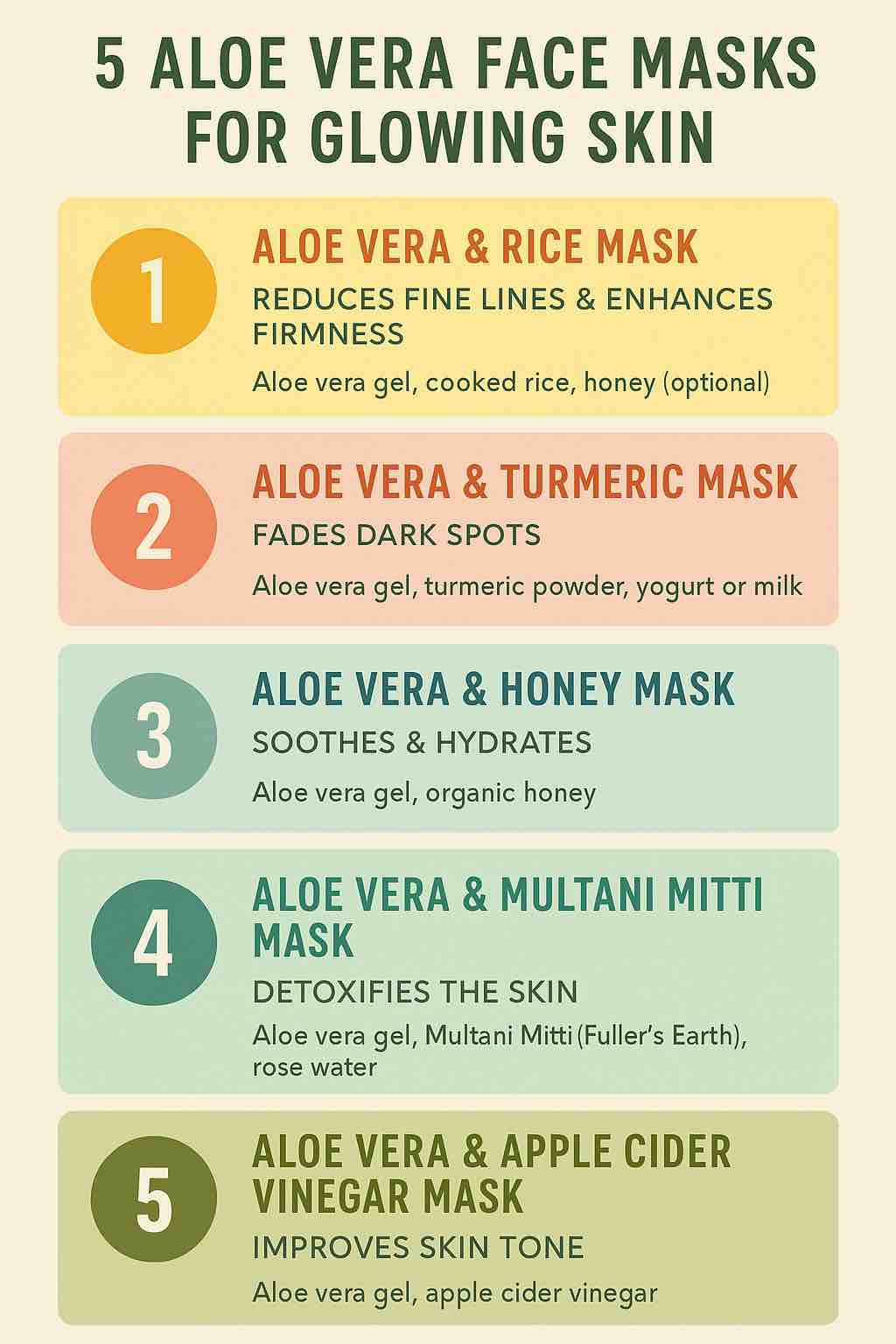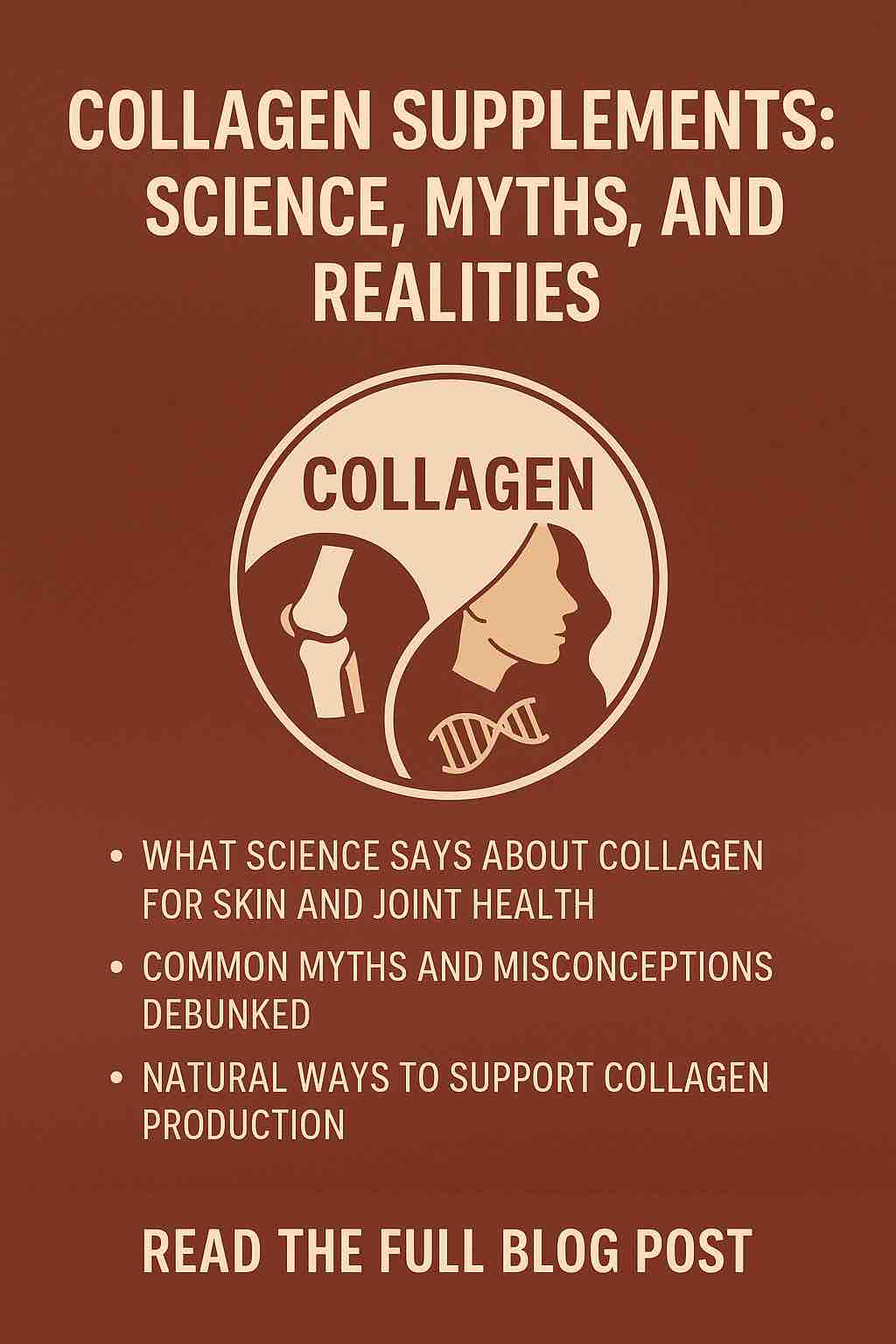
Imagine a simple, natural drink that not only quenches your thirst but can help you glow from the inside out—boosting both your skin’s radiance and your hair’s health. That’s the promise of coconut water, a staple in tropical regions for centuries and now a global wellness sensation. But what does science actually say? Is it just another wellness fad, or can coconut water really nourish your beauty inside and out? Let’s dig in, bust some myths, and give you actionable, practical tips for integrating coconut water into your routine.
What Is Coconut Water?
Coconut water is the clear, slightly sweet liquid found inside young green coconuts (not to be confused with coconut milk or oil). Naturally low in calories, it’s packed with electrolytes like potassium, magnesium, sodium, and calcium, plus a blend of vitamins, amino acids, and plant hormones (called cytokinins).
The Science-Backed Benefits
1. Hydration Hero for Skin and Body
- Why it matters: Hydrated skin is plump, resilient, and naturally glowing. Dehydration, by contrast, accentuates wrinkles, dullness, and flakiness.
- How coconut water helps: Thanks to its high electrolyte content—especially potassium—coconut water hydrates the body faster than regular water. This shows up as fresher, “dewier” skin when consumed regularly.
- Latest insight: Recent studies (2024–2025) confirm coconut water’s electrolytes help maintain the skin’s natural moisture barrier, making it especially helpful in hot climates or for people prone to dry skin.
Pro tip:
Swap one sugar-loaded soda or juice daily for 250–500ml of pure coconut water. Notice improvements in your skin’s texture and overall energy levels.
2. Rich in Antioxidants for Anti-Aging
- What are antioxidants? Compounds that fight free radicals—unstable molecules that damage cells, speed up aging, and trigger inflammation.
- How coconut water works: It’s rich in vitamin C, phenolic compounds, and cytokinins (like kinetin) that reduce oxidative stress, support collagen production, and fight fine lines.
- Latest research: Human skin cell studies (2025) show coconut water can decrease oxidative damage and may even promote longer cell life.
Pro tip:
Drink it chilled, and consider using it as a facial mist (details below) to help your skin fight environmental stressors—especially in urban settings with pollution.
3. Calms Inflammation and Fights Acne
- Anti-inflammatory action: Coconut water contains lauric acid and other bioactives known to soothe inflamed or irritated skin.
- Acne support: Its antimicrobial properties (confirmed in lab studies) can help keep acne-causing bacteria at bay, though it’s not a substitute for medical acne treatments.
Caution:
While coconut water can calm and hydrate, it’s not a miracle acne cure. Use it as a supportive part of a holistic routine.
4. Boosts Skin Elasticity & Radiance
- Vitamin C + Cytokinins: These support collagen synthesis, promoting firmer, more elastic skin.
- User reports: Many people report a “natural glow” and reduced dark circles after consistently drinking coconut water for 2–4 weeks.
5. Hair Health—From Follicles to Tips
- Scalp hydration: Coconut water is a lightweight, non-greasy hydrator for a dry or flaky scalp.
- Strength & growth: The mix of minerals, amino acids, and vitamins K & C boosts blood flow to follicles, helping with hair strength and reducing breakage.
- Clinical update (2023): A topical serum containing freeze-dried coconut water showed up to a 17% increase in hair growth and an 81% reduction in fallout over 90 days in clinical studies.
Practical Ways to Use Coconut Water
A. Drinking for Daily Beauty
- How much? 250–500ml per day is safe and effective for most adults.
- Best time: Morning or post-exercise for optimal absorption.
- For best results: Choose 100% pure coconut water, unsweetened, and preferably from a fresh coconut.
B. Topical Skincare: Easy DIYs
1. Coconut Water Facial Mist
- Pour coconut water into a clean spray bottle (optionally add 1–2 drops of rose water).
- Store in the fridge.
- Spritz on cleansed skin as a toner or anytime your skin feels dull.
2. Soothing Ice Cubes
- Freeze coconut water in an ice tray.
- Gently rub a cube over your face after sun exposure or before makeup.
3. Anti-Redness Mask
- Mix 2 tbsp coconut water with ½ tsp turmeric or sandalwood powder.
- Apply to blemished or inflamed areas; leave for 10 minutes, then rinse.
C. Hair & Scalp Routines
1. Scalp Spray
- Mix ½ cup coconut water with 1 tsp aloe vera gel or jojoba oil.
- Massage into the scalp pre-shampoo or as a leave-in spray.
2. Shine-Boosting Hair Rinse
- After shampooing, pour coconut water through your hair as a final rinse.
- Air dry for a natural, frizz-free finish.
What to Watch Out For
- Purity: Avoid brands with added sugars or flavors.
- Shelf life: Fresh coconut water is best; if using bottled, check expiry dates and opt for cold-pressed.
- Medical cautions: Those with kidney disease or on potassium-restricted diets should consult their doctor before regular use.
Myth-Busting: What Coconut Water Can’t Do
- It’s not a cure-all: Coconut water supports skin and hair health, but won’t cure severe skin disorders or replace prescription treatments.
- Acne: It can help calm skin, but should not be your only acne remedy.
The Bottom Line
Coconut water is more than just a trendy drink—it’s a multi-tasking, evidence-backed way to support your body’s hydration, skin radiance, and hair vitality from the inside out. The greatest benefits come from consistent use—drinking it regularly and integrating it thoughtfully into your daily beauty routines.
Ready to start glowing from within? Next time you spot fresh green coconuts or high-quality bottled coconut water, grab one and give these tips a try. If you’re a fan of DIY beauty, experiment with the simple recipes above—your skin and hair will thank you!
Share your coconut water stories or questions in the comments—let’s nourish from the inside out together!
FAQs
1. How much coconut water should I drink daily for skin and hair benefits?
Answer:
250–500ml (about 1–2 cups) daily is a safe and effective amount for most healthy adults. Listen to your body and consult a doctor if you have kidney or heart conditions.
2. Is coconut water better for skin when applied topically or when consumed?
Answer:
Both are beneficial! Drinking supports hydration and antioxidant levels from within, while topical use can soothe, tone, and refresh the skin. For best results, combine both.
3. Can coconut water cure acne or other skin problems?
Answer:
No, coconut water cannot cure acne or serious skin conditions. However, it can help calm irritation and support overall skin health as part of a balanced routine.
4. What type of coconut water should I use for skin and hair?
Answer:
Fresh, pure coconut water (from young green coconuts) is best. If buying bottled, choose cold-pressed, unsweetened, and preservative-free options.
5. Are there any side effects to using coconut water on the skin or hair?
Answer:
Side effects are rare, but some people may experience irritation. Always patch-test first, and discontinue if you notice redness or itching.
6. Can I use coconut water in combination with other skincare ingredients?
Answer:
Yes! Coconut water pairs well with aloe vera, rose water, turmeric, sandalwood, and green tea in DIY skincare. Avoid mixing with harsh chemicals.
7. Does coconut water help with dandruff or dry scalp?
Answer:
Yes, its hydrating and soothing properties can reduce dryness and flakiness. Use as a scalp spray or rinse for gentle relief.
8. How soon can I expect to see results in my skin and hair?
Answer:
Most people notice improved hydration and glow within 2–4 weeks of consistent use. Hair strength and reduced fallout may take 6–12 weeks.
9. Can children and pregnant women drink coconut water for these benefits?
Answer:
Generally, yes—coconut water is safe for most children and pregnant women. However, consult your healthcare provider if you have specific health concerns.
10. How should I store coconut water for topical or hair use?
Answer:
Keep fresh coconut water refrigerated and use within 24–48 hours for maximum potency. For DIY mists or rinses, make small batches and store in a clean, sealed container.













